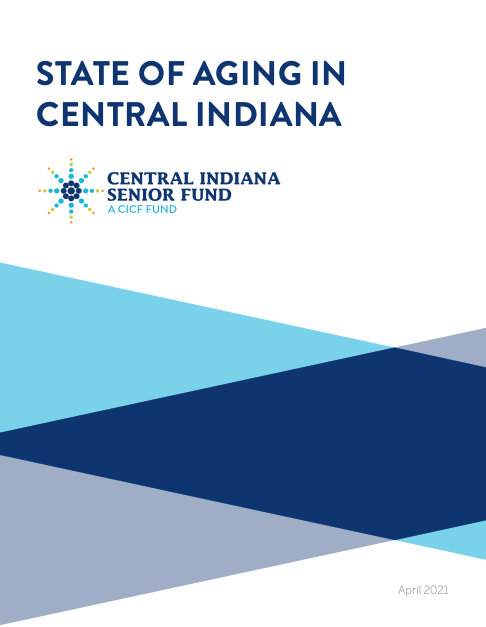Equity in Aging
SAVI Talks - April 22, 2021Older adults face inequities from the actions of individuals and organizations, and at institutional and systemic levels. These inequities are based on, but not limited to, differences in age, race, ethnicity, gender identity, and socioeconomic status and class.
On Thursday, April 22, The Polis Center, SAVI, WFYI, the IU Public Policy Institute, the IU Center on Aging Research, and the Central Indiana Senior Fund, a fund of the Central Indiana Community Foundation, will co-host the SAVI Talks: Equity and Aging webinar.
This event will look at existing financial stability inequities among Central Indiana’s older adult population and consider the impact of the COVID-19 pandemic. Presenters from The Polis Center and IU Public Policy Institute’s Center for Research on Inclusion and Social Policy will present the findings using a social-ecological model as a framework for interpreting the implications of the available data. Our panel noted below, representing social service agencies and the community, will discuss how these inequities are experienced by older adults and consider needed community action. Brittani Howell, Community Engagement Specialist, WFYI Side Effects Media, will moderate the discussion.
The findings draw from the State of Aging in Central Indiana Report, which was developed to serve as the premiere source of data related to growing older in Central Indiana. The report was developed by the Central Indiana Senior Fund in collaboration with The Polis Center at IUPUI, IU Public Policy Institute, and IU Center for Aging Research and will be published April 15.
Older Adults Experiencing Poverty
Articles and Story Maps
Explore other research and interactive content we have developed around equity.
Empowering Indiana Communities with Evictions & Foreclosure Data
More than 3.5 million U.S. households are threatened with eviction each year, a poignant illustration of rising housing costs. And, evictions have been rising steadily across Indiana since the end of COVID-19 eviction protections. The causes of eviction can be...
Empowering Indiana Communities with Evictions & Foreclosure Data
More than 3.5 million U.S. households are threatened with eviction each year, a poignant illustration of rising housing costs. The causes of eviction can be complex, following a synergy of poverty and low wages, rising rent costs, inflation, and drug and mental health...
Greenspace Assessment for Marion County
Greenspace is an important component of urban centers and can have many beneficial effects for both humans and the environment. However, greenspace is not equal across an entire urban center, nor can it be developed in the same ways throughout a city. Based on a...
Equity in Criminal Prosecutions: Analyzing Case Filings from the Marion County Prosecutor’s Office
The Kheprw Institute and The Polis Center are partnering to better understand the criminal justice system in Marion County and investigate potential disparities. Previous research from the Polis Center estimated that Black residents of Marion County were 2.7 times...
2022 Midterm Election Voter Turnout in Marion County
Key points Voter turnout in Marion County is low relative to Indiana and the U.S. Within Marion County, there is great variation in voter turnout between precincts Lower voter turnout in Marion County tends to occur in areas that are less affluent, have lower...
Transportation Equity and the Older Adult Population
Access to transportation is important because it empowers older adults to maintain their independence. Transportation opportunities for older adults may take different forms, including driving, public transportation, ride-share service, or shuttle buses. This report...
Follow the Money: Indianapolis Evictions in 2022
Eviction filings are on the rise compared to last year, but still lower than before the pandemic. Most evictions are from large owners of big apartment complexes.
Who is in the Marion County Jail? Exploring Length of Stay through an Equity Lens
We analyzed more than 283,000 bookings into Marion County’s jails between 2013 and 2021 to discover how many people are in jail, the characteristics of those in jail, and how long people remain in jail. This dataset spans nine years. In that time, state laws changed...
The State of Tenants in Central Indiana
Indiana Senate Bill 230 would have required landlords to make necessary repairs to their properties. We examine the renters impacted by the bill’s failure.
Modern Redlining in Indianapolis?
Our analysis of one million loan applications since 2007 shows that, even when income and debt are the same, having a Black applicant on the loan increases the odds of being denied by 2-3X, and applying for a loan in a historically redlined neighborhood increases the odds of denial by 50 percent.
Contributors
Central Indiana Senior Fund Advisory Board
H. Ken Bennett, Center for At-Risk Elders
C. Andrew Class, M.D., St. Vincent Stress Center
Susan Guyett, Retired
Kim Jacobs, Television Producer and Writer
James Leich, Retired President, LeadingAge Indiana
Jane Malkoff, Scout Advocacy
Ellen Miller, UIndy Center for Aging & Community
Keesha Dixon, Asante Art Institute of Indianapolis
Candace Preston, Veterans Health Administration
Heather Hershberger, Consultant
State of Aging in Central Indiana Report Advisory Committee
Gerald Ardis, Flanner House
Duane Etienne, President Emeritus, CICOA Aging & In-Home Solutions
Pat Healey, Ascension Health
Kathryn McEntire, RCI
Ellen Miller, UIndy Center for Agency and Community
Michelle Niemier, Center for At-Risk Elders
Todd Wagoner, Community Health Network
Carolyn Watts, Retired, Indiana Department of Child Services
Ruth Williams, Edna Martin Christian Center
Dustin Ziegler, CICOA Aging & In-Home Solutions
Produced by The Polis Center at IUPUI and SAVI in partnership with the IU Center for Aging Research, and the IU Public Policy Institute’s Center for Research on Inclusion and Social Policy.
IU Center for Aging Research (IUCAR), Regenstrief Institute
Nicole Keith, Research Scientist
Steven Counsell, Research Scientist
Dan Clark, Research Scientist
Center for Research on Inclusion and Social Policy (CRISP)
Breanca Merritt, Chief Health Equity and ADA Officer, Indiana Family and Social Services Administration (Founding Director of the Center for Research on Inclusion and Social Policy)
Kelsie Stringham-Marquis, Research Coordinator, IU Public Policy Institute (PPI)
Katie Rukes, Program Analyst, PPI
The Polis Center at IUPUI (Polis)
Karen F Comer, Director, Collaborative Research
Rebecca Nannery, Senior Research Analyst
Jeramy Townsley, Faculty Research Analyst
Unai Miguel Andres, Research Analyst
Jay Colbert, Data Manager
Matt Nowlin, User Experience Designer
LaShawnda Crowe Storm, Community Organizer
Sharon Kandris, Associate Director
Research Support
Amnah Anwar, Research Assistant, Polis
Mackenzie Dafferner, Research Assistant, IUCAR
Mandy Dhillon, Research Assistant, Polis
Destiny Faceson, Research Assistant, CRISP
Weston Jones, Research Assistant, CRISP
Patrick Lai, Graduate Research Assistant, Polis
Rubi Mallers, Graduate Research Assistant, PPI
Emma Morone, Graduate Intern, Polis
Melissa Sherman, Graduate Research Assistant, IUCAR
Event Partners





